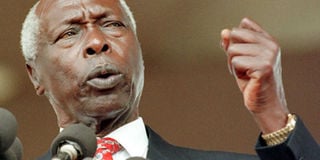Moi worked for peace but nearly took Kenya to war with Uganda

In this file photo taken on January 5, 1998 Kenyan President Daniel arap Moi delivers his inaugural speech after he was sworn in for final five-year term in Nairobi. AFP PHOTO
What you need to know:
- When former Kenyan President Mwaki Kibaki contested for presidency against Moi in 1992, Kampala was accused of financing him.
On July 30, just three days after toppling Obote in the 1985 coup, Uganda’s new head of state, Gen Tito Okello Lutwa, embarked on a peace mission with the forces that had been fighting the regime he had toppled.
The peace mission saw him fly to Dar es Salaam that day for a meeting with Tanzanian President Julius Nyerere. Gen Okello wanted Nyerere to mediate the peace talks with Yoweri Museveni’s National Resistance Army (NRA) rebels.
This was because Gen Okello had spent eight years of exile in Tanzanian and was among the Ugandan exiles who returned with the Tanzania forces to topple Amin in 1979.
So he was well known to Nyerere. Also, Gen Okello looked at Nyerere as a statesman of international acclaim.
Nyerere agreed to mediate the peace talks, but when the NRA/M rebel leader Museveni was invited for the talks, he did not show up.
A Kenyan newspaper, Weekly Review, reported that Mr Museveni had rejected the choice of Dar es Salaam because “the NRA was wary of Nyerere’s friendship with Obote, and viewed the Military Council and the UNLA as a continuation of Obote’s regime. As an alternative, Kenya’s arap Moi was approached and the venue for talks moved to Nairobi [Kenya].”
On August 26, 1985, the talks in Nairobi started. The talks were initially planned to be held at State House in Nairobi. On the first day, both Moi and Gen Okello waited for Mr Museveni and his team but they were a no show, despite being known to be in Nairobi at the time. Moi did not give up and the next day, he shifted the talks from State House to the President’s Office, also known as Harambee House. Even at Harambee House, Mr Museveni and his team did not show up until afternoon.
The talks were centred on power-sharing and the composition of the Military Council which had been announced by Gen Okello soon after the coup. Talks dragged on for four months, forcing Moi to threaten calling them off. He warned that “if Ugandans weren’t ready to talk, they could as well pack and go back to their country,” President Moi was quoted by the Weekly Review.
An agreement was signed in December, but just before the ink dried, fighting had resumed at full scale. The NRA rebels were pushing for military victory.
The resumption of war hurt Moi’s morale after basking in international limelight for having secured a peace agreement between the Ugandan government and the rebels. The NRA eventually captured power in 1986. These circumstances were later to breed icy relations between President Moi and new Ugandan President Museveni.
“President Moi behaved as if he didn’t know there was a fellow head of state in Uganda and never made any reference to him,” quoted the Weekly Review.
The fall out
Seemingly trying to pay back for the international humiliation, in early 1987, President Moi ordered ‘aliens’ from a neighbouring country he did not mention, to leave Kenya. Although the neighbouring country of the ‘aliens’ was not named, many Ugandans were arrested in Kenya following Moi’s presidential directive.
Later that year, on December 15, 1987, at least 26 NRA soldiers were killed on Kenyan soil, worsening the precarious situation between the two presidents. The two countries almost went to war in the subsequent days when Moi ordered for military tanks to be moved to the border town of Busia and Mr Museveni counter-ordered anti-aircraft and infantry troops to move to the Uganda border with Kenya.
With tension rising, it was Mengistu Haile Mariam and Ali Hassan Mwinyi, the then presidents of Ethiopia and Tanzania, respectively, who intervened to defuse the tension. Mr Museveni and Moi met at Malaba border for talks.
Two years after the meeting, the two countries resumed hostility. In March 1989, two bombs were dropped in Lokichogio in Kenya by Ugandan military planes. As Kenya was planning retaliation, an emissary was sent to Nairobi for talks and the situation calmed down, but did not normalise until after a meeting in August 1990 between Moi and Mr Museveni again at Malaba border town.
When former Kenyan President Mwaki Kibaki contested for presidency against Moi in 1992, Kampala was accused of financing him. After winning the election, Moi was not shy to publicly accuse his Ugandan counterpart in 1993 for “offering refugee and training camps to guerilla armies working to overthrow him.”
However, by the time Moi handed over power to his successor Mwai Kibaki in 2002, the two Ugandan and Kenyan leaders seemed to have mended fences. President Museveni was invited to Nairobi to witness Moi’s handover to Kibaki.




